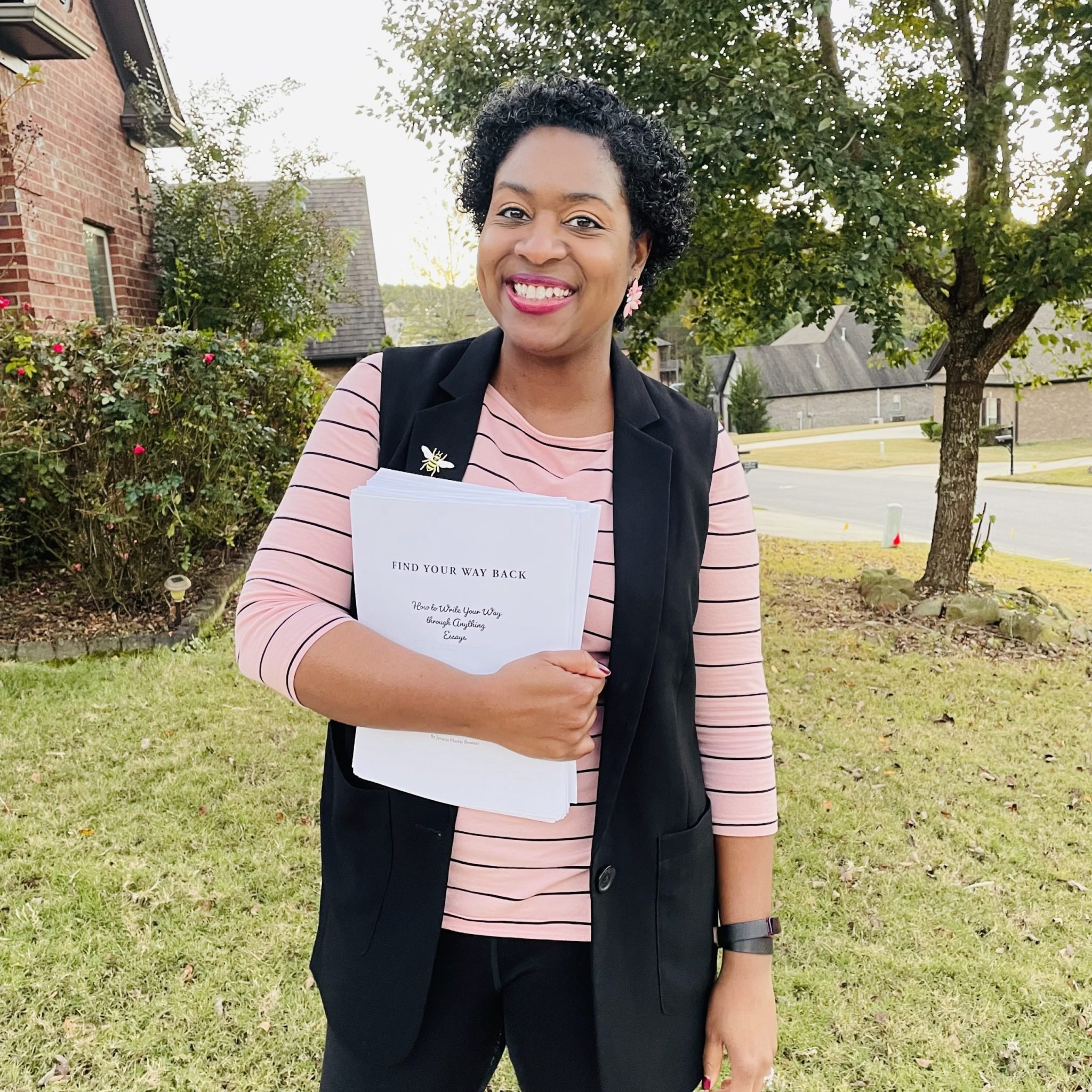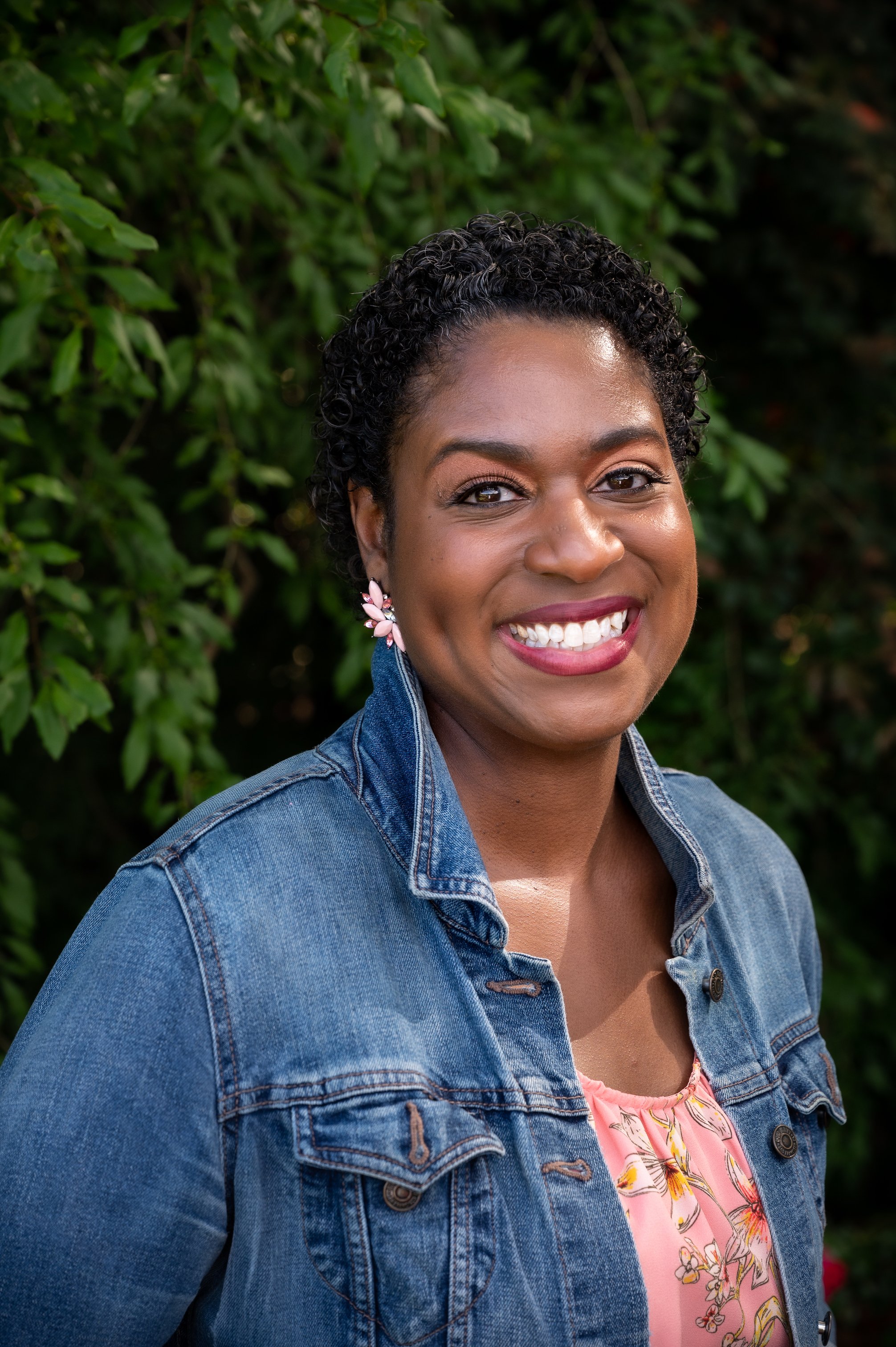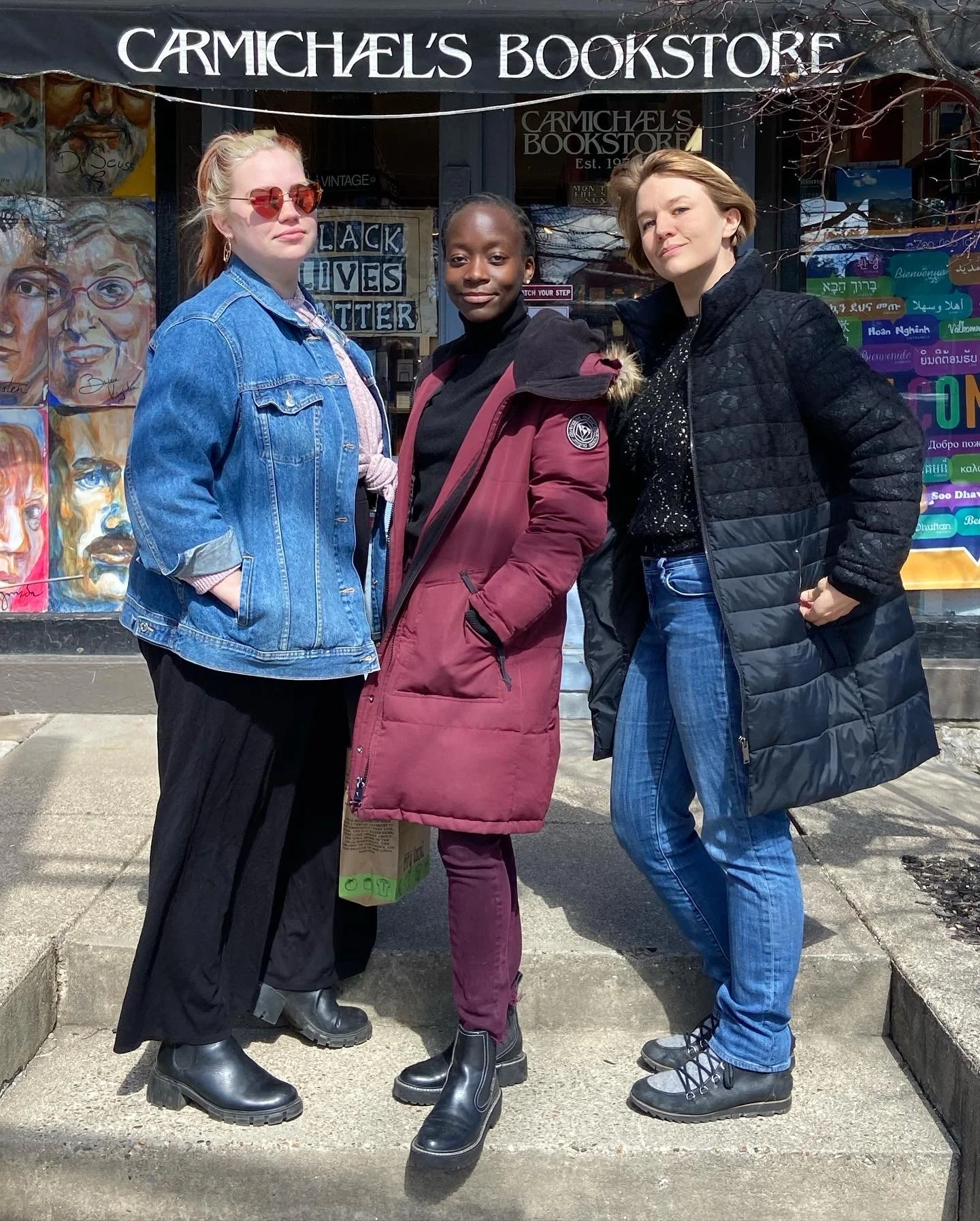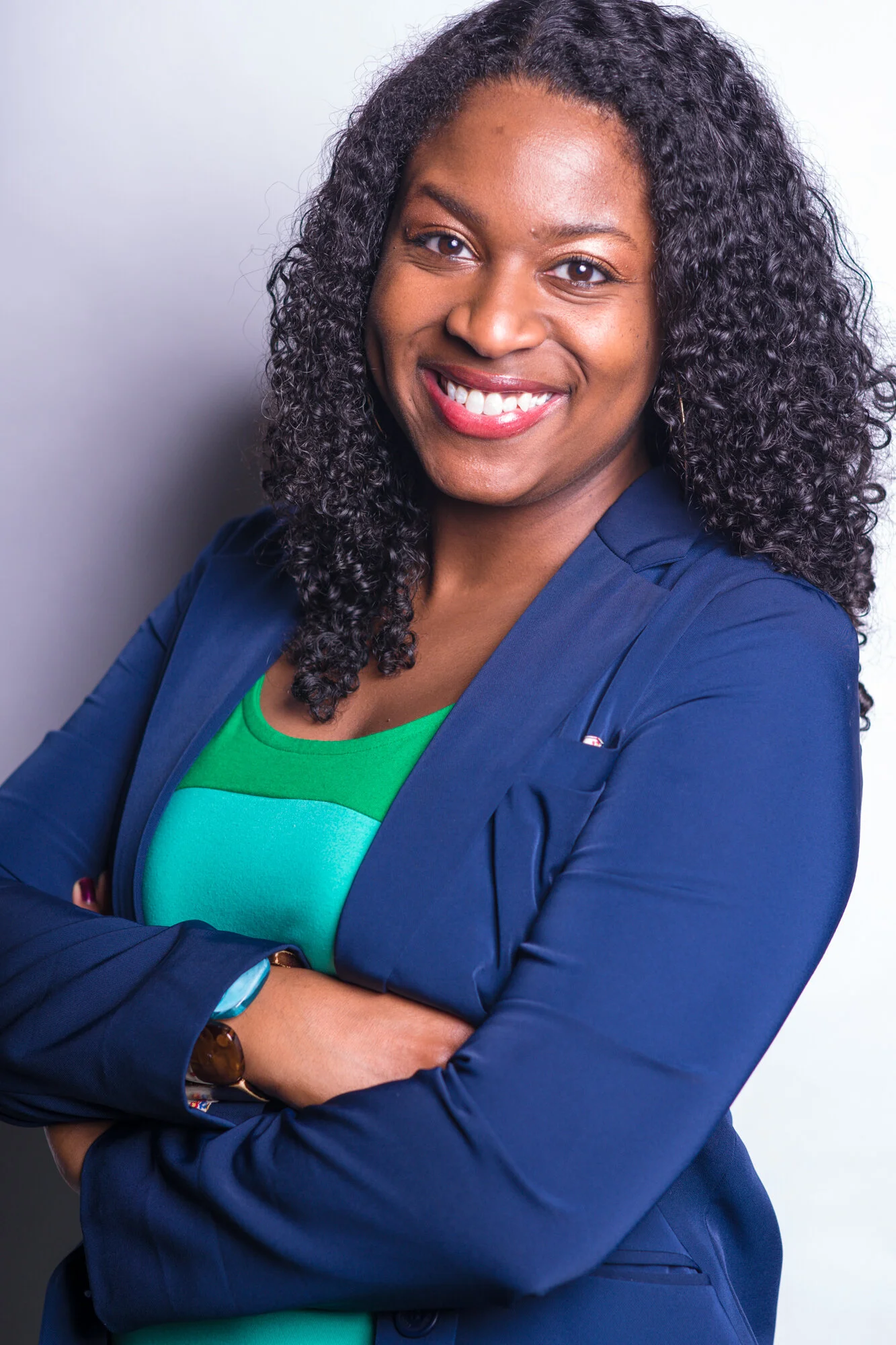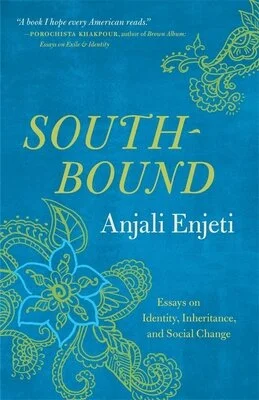Hot Off the Shelf: Find Your Way Back by Javacia Harris Bowser
[image description: Book cover of Find Your Way Back: How to Write Your Way Through Anything by Javacia Harris Bowser. The book cover is yellow with an illustration of a bald Black woman wearing a hot pink scarf, green shirt, and gold earrings. The title is written in hot pink.]
When I tell you I’ve been waiting to read Find Your Way Back for a decade, I don’t mean that the book has been collecting dust on my shelf for 10 years and I’m only now getting around to it. I mean that I so admire and look up to the author, Javacia Harris Bowser, that I’ve read a ton of her work from the past 10 years I’ve known her and I’ve been anxiously awaiting her first book. Javacia has taught me everything I know about freelancing and the reason I’m able to pay my bills doing what I love.
Reader, it’s here! Find Your Way Back: How to Write Your Way Through Anything is officially out!
Javacia has taught me everything I know about freelancing and the reason I’m able to pay my bills doing what I love, so I’m going to give you the synopsis of the book, then we’re going to take a trip down memory lane.
Synopsis:
Award-winning freelance journalist Javacia Harris Bowser is convinced that writing is a superpower. She sees her life as proof of it since writing has helped her navigate marriage, crisis of faith and body image issues. It also helped her to beat cancer.
As a Black woman from the South, Javacia has used the written word to explore issues of gender and race as well as religion. Find Your Way Back is a collection of essays that demonstrate how Javacia has used writing to achieve some of her wildest dreams such as being a public speaker, having her own column, and being her own boss. The book also explores how writing, self-love, and faith helped her overcome her worst nightmare: a cancer diagnosis in 2020. Javacia’s goal is to show readers how writing can transform their lives as well. The book includes prompts throughout to help readers start their own writing journey.
This book is for the woman who has wanted to write since she was a girl but struggles to find the time or the courage to put her words on paper. Find Your Way Back shows that instead of putting writing on the back burner when life gets turned upside down, we should turn to it to help life make sense again.
Javacia Harris Bowser standing under a tree while holding her printed out manuscript.
I met Javacia in 2011 when I was a baby writer. I was a directionless 21-year-old, full to bursting with words, but with no idea what to do with them. And it’s not like there were job openings for “aspiring novelists” in the classifieds.
I joined See Jane Write, a women’s writing group that Javacia started and began coming to events. In addition to her own expertise, which she acquired through multiple degrees and her work as an award-winning journalist, Javacia brought in other experts too. Over the years I learned how to pitch and write for publications, how to market myself on social media, and how to start a blog to keep me consistent in my writing practice and help me land opportunities. That’s right, Off the Beaten Shelf wouldn’t exist without Javacia.
The funny thing is, Javacia told me to start a blog in 2011 and I kept putting it off. I’d say, “But Javacia, I don’t know what to blog about!” This is hilarious to me now considering that I started Off the Beaten Shelf in 2014 and it’s now been going strong for 8 years.
2014 was also the year I really started taking Javacia’s advice to heart. I treated my blog and baby freelance side hustle like a legit business. She didn’t offer quick fixes and get-rich-quick tips (because we all know that’s bullshit and nothing worth doing is easy!) but she kept the group inspired and motivated to keep going. Slowly but surely, I got better at pitching, which helped me land better gigs, and I got better at writing, which helped me keep them.
In addition to what I had published in local magazines and alt-weeklies, I privately worked on my creative nonfiction. I attended See Jane Write workshops on crafting personal narratives and shared the seeds of what would become my essays in the safe haven of the group. If you’d have told me then that one of my essays would end up in the New York Times, I’m not sure I’d have believed you. But because of what Javacia has taught me, I got to cross that item off my bucket list.
Javacia in a red blazer standing in front of a wall that says “Black is magic. Black is dope. Black is power. Black is important. Black is unapologetic,” etc.
I tell you all this because of Find Your Way Back’s subtitle: How to Write Your Way Through Anything. In addition to writing her own way through marriage, body issues, cancer, racism, and sexism, Javacia has been teaching the Janes how to write our way through anything for years.
And not just through, but to. She’s taught us how to write our way through the bad shit and to the good shit. I’m firmly in the camp of believing that a lot of self-help and books labeled “inspirational” are cheesy and often full of empty platitudes rather than actual, practical advice. But that’s not the case with Find Your Way Back. Javacia has singlehanded changed the course of my career, and therefore my life, and she’s managed to distill a lot of her actionable wisdom into fun, entertaining, poignant essays. Find Your Way Back is as entertaining as it is helpful, and in the least cheesy way possible, it’s inspirational too.
And before you shake your head about a book with cancer, know that Find Your Way Back is nothing even close to a sob story. Javacia doesn’t write from a place of victimhood because she’s not one. Her life hasn’t always been easy, but her essays celebrate making it out not only alive but thriving.
And though it’s a fine balance, Javacia’s essays don’t uphold the trope of the strong Black woman either––a trope that’s damaging because it so often paints Black women as superhuman while dismissing their pain and ignoring their needs. Javacia is definitely strong––no one is going to deny that––but she’ll tell you that her strength comes from her self-care: rest, taking time for herself and her family and friends, binging TV shows, watching wrestling, and dancing to Beyonce.
The self-care Javacia practices and encourages others to espouse is radical self-care, not the commercialized notion of self-care that’s aimed toward getting you to buy something to make you feel better. Radical self-care is saying no, setting boundaries, taking time off, and valuing your work so that you charge commensurate to your worth and you don’t have to bust your buns every damn day.
Speaking of binging, did I mention that Find Your Way Back is extremely binge-able? I started reading late one night and the next thing I knew I was 90 pages in.
A photo of Javacia in front of a bush. She’s wearing a denim jacket, a pink floral blouse, and pink earrings.
I could keep gushing about Javacia (seriously, how much time do you have?) but I’ve got a treat for you: an interview with her!
How do you imagine this book helping your readers? What aspirations do you carry for them that you hope to convey through your essays?
Quite simply, I just want to inspire people to write. My hope is that my stories and the writing prompts in the book will spark an idea that will push readers to write stories of their own––whether that’s for a blog, a book, or just a journal entry. And I hope that readers who don’t do so already will start to turn to writing to get through tough times. Instead of waiting for the storms of life to pass and then writing, we can use writing to anchor us.
Representation in the media is so important in creating a kinder and more empathetic society. Hypothetically, if you were to write a movie script, one that was guaranteed to reach thousands of people, who or what would you want that movie to be about?
I want to see a movie about a group of friends who are over the age of 35 and from a variety of ethnic backgrounds navigating love and life and I want the movie to be based in the South. Women are often treated as obsolete after the age of 35. Stories set in the South are usually full of stereotypes––and clearly written by people who aren’t Southern––or are solely focused on struggle. And though this is improving, it’s still a bit rare to see diverse adult friend groups on TV. I would write a movie that challenges all these issues.
Many creative types often find inspiration in heartbreak and other emotionally painful situations. Do you have any advice about how to continue finding the inspiration to create once you find happiness? How did you continue to write about love after finding happiness and love in your partner?
That’s a great question! And I share in the book that at one point I even thought it would be difficult to be a writer once I had a stable, steady relationship. But there are so many other things to write about outside of romantic relationships. Also, no relationship is perfect, so there will always be some type of conflict to navigate. Furthermore, I think that once we’re in a space of contentment in life––regardless of relationship status––it’s then our responsibility to use our story to help others.
In the essay, ‘Chocolate Girl,’ you mention that you thought colorism had “gone out of style with Gen Z.” Can you explain what you have witnessed about colorism across generations that led you to think this?
As I mentioned in the essay, when I was a teacher I had been delighted to see my Black students celebrate their skin color. It was a refreshing change that I experienced from the older members of my family who treated dark skin like a curse. So that’s why I was so disheartened when I overheard one of my Black students wanting to be called “caramel” instead of “chocolate.”
Birmingham, Alabama, and the South as a whole has had a large impact in your life. You mentioned that you struggled to see how being a feminist could co-exist with your love for the South. Are there other parts of yourself that seem to conflict in this way that you’ve used writing to reconcile?
Yes, it was through writing that I realized my feminist ideals and Southern values don’t have to clash but can actually bolster one another. I value marriage but I’ve used writing to show others––and myself––that you can be true to your partner and still be true to yourself. My faith is a big part of my life and through writing, I’ve realized that religion doesn’t have to be oppressive. Writing is a form of worship and it’s one that is quite liberating.
There are a number of things in life that can cause a person’s faith to waver or even disappear altogether. Can you tell us more about the periods of time that you spent without faith and how you found your way back to God and your faith?
Whether it’s a cancer diagnosis or great disappointment from a church leader, my faith has been challenged many times throughout my life. And I know this seems to be my answer for everything, but each time my faith wavers I write my way back to God. I write my prayers, I use Scripture to write affirmations, and I write about the future I desire as if God has already blessed me with it.
Your book includes writing prompts about a variety of topics. One reader may feel compelled to write for a certain prompt over another. Is there a universal question that we should all ask ourselves to know ourselves better?
I think we should all ask ourselves “What do I want and why do I want it?”
During your time teaching, you mentioned that you worked to create a “feminist classroom,” a place that you believe “values equality, equity, respect, and representation and makes those values apparent every day.” How can someone in any profession create ‘feminist spaces’ in their work life?
You can begin to create a feminist space in your work life by finding ways to promote those aforementioned values: equality, equity, respect, and representation. If you’re in certain rooms, speak up for someone who’s not there. Be a mentor. Be an advocate. Stand up for yourself. Stand up for others. Stand up for what’s right.
Do you believe that writing and reading about injustice and inequality in our country can lead to true reform and change? How can writing be a form of powerful activism?
I do think that writing and reading about injustice and inequality are important, but they must both become communal acts to bring about reform. So, when you read something that transforms your way of thinking about an issue, share that knowledge with someone else. Likewise, after you write about social justice issues, share that writing with someone else. Even your personal story has the power to change lives when you share it with others.
Your book is so personal and inviting that it feels like the reader is talking to a good friend. In being so open and honest, do you still write pieces you don’t want to share with the world? What makes a piece private versus something that you share with your audience?
My hope was that people reading the book would feel as if they were sitting down having a conversation with me over a glass of wine or cup of tea. So that’s why I was willing to be open and honest in my essays. However, I do have a rule about what I will and will not share. “Write from scars, not wounds” is my motto. I don’t share my struggles until I’ve had time to process them. That doesn’t mean I don’t write and share about ongoing battles. Even if I’m not completely on the other side of an issue, I will share it if I have learned a lesson from it. But unless there’s a message in the mess, I keep the writing private.
If Find Your Way Back sounds excellent to you––and I hope it does!––you can buy yourself a copy. Javacia has paperbacks, signed paperbacks, and ebooks.


